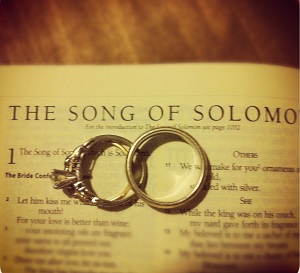I’ve been reading the Song of Solomon devotionally, and I can’t help but think it’s meant to picture Jesus and the Church. The woman’s delight in her husband (Song of Solomon 1:16-17) makes me think of Peter’s statement that loving Jesus causes believers to “rejoice with joy that is inexpressible” (1 Peter 1:8). The man’s exclusive covenantal love for his wife (Song of Solomon 6:8-9) makes me think of Jesus’ high priestly prayer asking His heavenly Father to pour out special blessings exclusively on His people (John 17:1-26). And the celebration of the bride’s purity (Song of Solomon 8:8-13) reminds me of Christ’s deep desire for His Church to be holy (Ephesians 5:26-27).
 My interpretation wouldn’t surprise most Christians throughout church history because a great many of them have interpreted this book as an allegory picturing Christ and the Church. In fact, many King James Bibles include section headings like these for chapter 4: “Christ setteth forth the graces of the church” and “The church prayeth to be made fit for his presence.”
My interpretation wouldn’t surprise most Christians throughout church history because a great many of them have interpreted this book as an allegory picturing Christ and the Church. In fact, many King James Bibles include section headings like these for chapter 4: “Christ setteth forth the graces of the church” and “The church prayeth to be made fit for his presence.”
Some contemporary interpreters, on the other hand, would view my interpretation with less enthusiasm. Flipping through two popular (and helpful) books on Song of Solomon, I see hardly any reference to its being an illustration of the relationship between Jesus and His people. Indeed, the pendulum has swung. Today many regard Song of Solomon as a poem extolling marital intimacy and not principally, or even at all, a picture of Christ and the Church.
In many ways, I’m thankful for the pendulum swing, for Christians should, indeed, celebrate the affective and sensuous aspects of love between a husband and wife. And interpreters who obscure or deny these realities because of their discomfort with the book’s intimate language are in error. However, in some cases, I’d suggest that the pendulum has swung too far. It seems to me that interpreting this book isn’t an either/or proposition; it’s a both/and. Here’s why.
The New Testament teaches that God designed marriage so that it inherently pictures Christ and the Church. After what is perhaps Paul’s most famous description of the husband-wife relationship, he adds, “This mystery is profound, and I am saying that it refers to Christ and the church” (Ephesians 5:32).
When Jesus appeared to two disciples on the road to Emmaus following His resurrection, “beginning with Moses and the Prophets, he interpreted to them in all the Scriptures the things concerning himself” (Luke 24:27). We don’t know exactly what passages Jesus referenced in that conversation, but Luke’s basic meaning is that He explained how the entire Old Testament foreshadowed His life and ministry. It’s difficult to imagine Jesus’ explaining how He was the prophet greater than Moses (Deuteronomy 18:15), the eternal king in David’s line (2 Samuel 7:12-13), and the inaugurator of Jeremiah’s promised new covenant (Jeremiah 31:31-34) but then steering clear of Song of Solomon, because it was “purely about sex.”
Of course, we shouldn’t force every Old Testament passage into an allegory, insisting that Rahab’s scarlet cord symbolizes the blood of Christ and Moses’ staff pictures the cross. But Song of Solomon is different. It’s a poem whose principal subject was designed by God to symbolize Christ and the Church. So shouldn’t our interpretation of this book include the idea that it illustrates Jesus’ great love for His people?